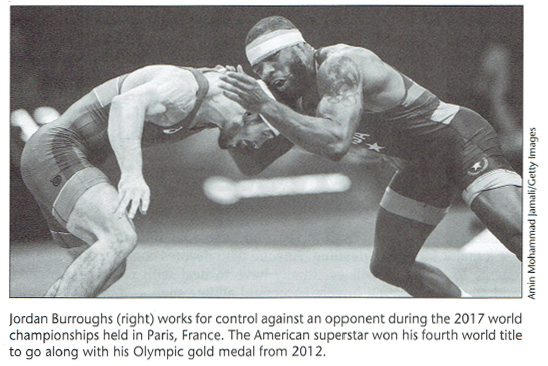|
By: Mike Chapman Originally Published in: Wrestling Tough Provided by: Human Kinetics Setbacks are common, both in sport and everyday life, and they certainly are a major factor in wrestling. Anyone who devotes considerable time and energy to wrestling will eventually have to deal with pressure, setbacks, and adversity - even a hugely successful athlete such as a multiple world/ Olympic champion. Jordan Burroughs' struggle with adversity came after a poor performance in the 2016 Olympics and grew to epic proportions. From 2011 to 2015, no one in wrestling was riding higher than Burroughs. In his final two seasons at the University of Nebraska, he captured NCAA titles and won the Dan Hodge Trophy as the nation's top college wrestler of 2011. Entering international competition immediately, he went on one of the most spectacular rides in U.S. history. He won the world championships at 163 pounds in 2011 and Olympic gold in 2012 and followed up with world titles in 2013 and 2015 after earning a bronze medal in 2014. Heading into the 2016 Olympic Games in Rio de Janeiro, Brazil, the Husker was considered the heavy favorite to win his fifth world-level gold medal at 163 pounds. But disaster struck. After an opening round win, Burroughs was beaten twice and eliminated from the medal rounds. To make matters worse, the last loss was by an 11-1 score! America's brightest mat star came home with a shattered self-image. He even considered retiring from the sport he loved. "After such a forgettable performance, my mystique had vanished heading into 2017," he wrote. "The superhero bravado that had taken years to acquire was gone, and what remained was vulnerability and a man stripped of his identity. As I cried on camera, I instantly became a fading superstar, while hungry, younger talent waited to stake claim as America's next 74-kilogram wrestler" (Burroughs 2017, 8). What transpired in the coming months was the result of intense introspection and working on a plan with his two Nebraska mentors, coaches Mark Manning and Bryan Snyder. Together, they developed a plan to put Burroughs back on the top of his game. He withstood a rugged trials to make the U.S. team and then landed in Paris for the world championships, eager to once again show that he was among the elite wrestlers on the globe. Burroughs won again and regained the superstar status he had longed for. He credits his faith in God and the support of family and friends. And, importantly, he ignored the negativity that had struck at him from external forces. "When I made the decision to come back to wrestle, I also made a point to turn a blind eye to most of the Internet world and the negativity that can be a distraction from greatness," he wrote. "I stayed out of the forums and refrained from reading YouTube comments. I blocked all social media trolls. I had to have unwavering focus. This gave me the ability to manage the amount of praise and criticism that entered my mind and heart" (Burroughs 2017, 43).
Burroughs won all five matches in Paris to capture his fifth world-level gold medal. He is now tied with Bruce Baumgartner for second place on the list of America's gold medal winners on the international stage. Only John Smith, who has won six world-level championships, is ahead of him. Like Lee Kemp, another great 163-pounder nearly four decades earlier, Burroughs had to learn the powerful lessons that come from adversity. After winning three NCAA championships for the University of Wisconsin, Kemp immediately turned his focus on the international scene. In 1978, he became the youngest world champion in American history (an honor that now belongs to Kyle Snyder), winning gold at 163 pounds in Mexico City when he was just 21 years and eight months old. He credits facing adversity and overcoming it with helping him climb to the highest rungs of success. "As I reflect back, I have learned that the struggles and trials I experienced early in my life were actually shaping me for the man I was to become, and without them, I certainly would not have had the intense desire to be successful and to feel important and feel like I belonged somewhere," wrote Kemp in his 2017 book, Winning Gold: Success Secrets of a World Champion (7). He said that he had felt unwanted after being given up at birth and living in foster homes for the first five years of his life before being adopted. "I do not remember much about that part of my life, other than feeling alone and insignificant," he wrote. After discovering wrestling, Lee entered onto a path to self-respect. "My success story started at age 14 when I was in ninth grade, just nine years out of foster homes" (Kemp 2017, 7-8). Little more than six years later, he was a world champion! Wayne Baughman has one of the most distinguished pedigrees in American wrestling, winning 16 national titles (in college, freestyle, Greco-Roman and sambo). He also made three Olympic and eight world teams and coached at the international level for years. In addition, he served as head coach at the Air Force Academy for 27 seasons. "Adversity is a reality of life and wrestling. Overcoming adversity is necessary to becoming a productive and contributing citizen and a winning wrestler," he said in 2017. "Adversity builds character and strength. Adversity generates creative thinking and positive response/reaction to stress. Adversity forces problem solving. |








